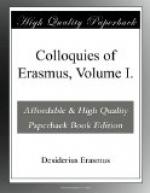Ca. That it is not. I lately began to read Seneca’s Epistles, and stumbled, as they say, at the very Threshold. The Place is in the first Epistle; And if, says he, thou wilt but observe it, great Part of our Life passes away while we are doing what is ill; the greatest Part, while we are doing nothing, and the whole of it while we are doing that which is to no Purpose. In this Sentence, he seems to affect I can’t tell what Sort of Witticism, which I do not well understand.
Le. I’ll guess, if you will.
Ca. Do so.
Le. No Man offends continually. But, nevertheless, a great Part of one’s Life is lost in Excess, Lust, Ambition, and other Vices; but a much greater Part is lost in doing of nothing. Moreover they are said to do nothing, not who live in Idleness, but they who are busied about frivolous Things which conduce nothing at all to our Happiness: And thence comes the Proverb, It is better to be idle, than to be doing, but to no Purpose. But the whole Life is spent in doing another Thing. He is said, aliud agere, who does not mind what he is about. So that the whole of Life is lost: Because when we are vitiously employ’d we are doing what we should not do; when we are employ’d about frivolous Matters we do that we should not do; and when we study Philosophy, in that we do it negligently and carelesly, we do something to no Purpose. If this Interpretation don’t please you, let this Sentence of Seneca be set down among those Things of this Author that Aulus Gellius condemns in this Writer as frivolously witty.
Hi. Indeed I like it very well. But in the mean Time, let us fall manfully upon the Hen. I would not have you mistaken, I have no more Provision for you. It agrees with what went before. That is the basest Loss that comes by Negligence, and he shews it by this Sentence consisting of three Parts. But methinks I see a Fault a little after: We foresee not Death, a great Part of it is past already. It is my Opinion it ought to be read; We foresee Death. For we foresee those Things which are a great Way off from us, when Death for the most Part is gone by us.
Le. If Philosophers do sometimes give themselves Leave to go aside into the Meadows of the Muses, perhaps it will not be amiss for us, if we, to gratify our Fancy, take a Turn into their Territories.
Hi. Why not?
Le. As I was lately reading over again Aristotle’s Book that he entitles [Greek: Peri ton elenchon], the Argument of which is for the most Part common both to Rhetoricians and Philosophers, I happen’d to fall upon some egregious Mistakes of the Interpreters. And there is no Doubt but that they that are unskill’d in the Greek have often miss’d it in many Places. For Aristotle proposes a Sort of such Kind of Ambiguity as arises from a Word of a contrary Signification. [Greek: ho ti manthanousin oi epistamenoi ta gar apostomatizomena manthanousin oi grammatikoi to gar manthanein omonymon, to te xunienai chromenon te episteme, kai to lambanein ten epistemen.] And they turn it thus. Because intelligent Persons learn; for Grammarians are only tongue-learn’d; for to learn is an equivocal Word, proper both to him that exerciseth and to him that receiveth Knowledge.




